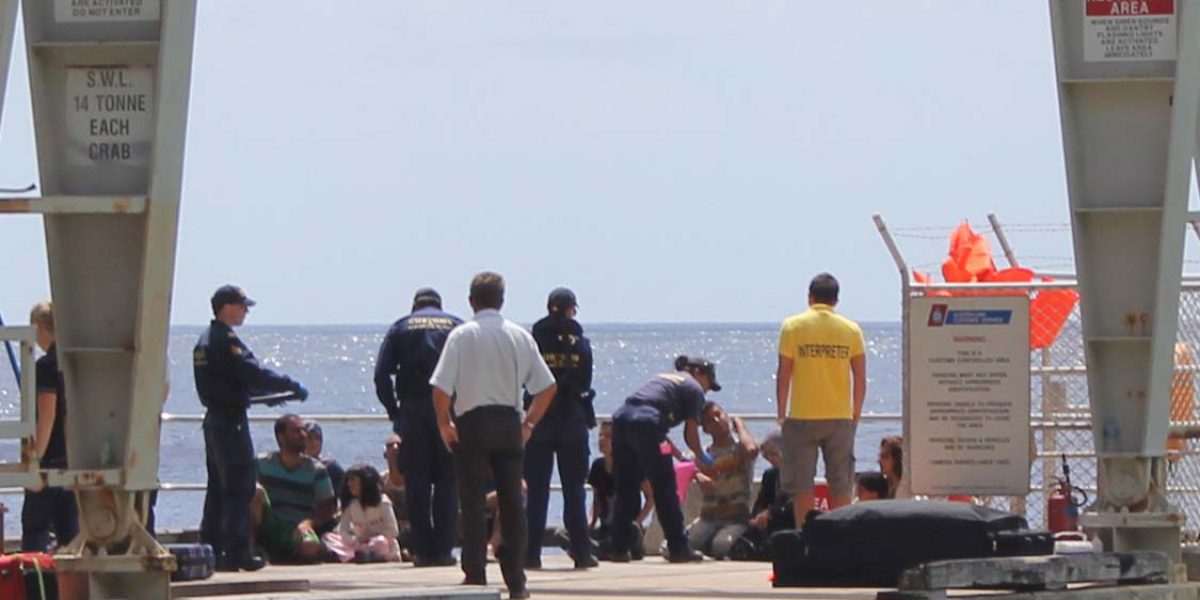Australia: Asylum seekers facing more difficulties
29 October 2013|Catherine Marshall

Sydney, 29 October 2013 – The installation of the new federal government has intensified the difficulties being experienced by the more than 2,200 asylum seekers currently detained on Christmas Island, the 1,061 transferred to Manus Island and 827 sent to Nauru.
Mr. Oliver White, Head of Policy and Advocacy, Jesuit Refugee Service (JRS) Australia, recently returned from Christmas Island where he witnessed the damaging implications for a group of people being used as a deterrent against future boat arrivals: suicide attempts, the lockdown of detainees and families split apart.
The former Labor government implemented the so-called PNG Solution on July 19, stating that all asylum seekers arriving by boat from that date onwards would be sent to Papua New Guinea (PNG) or Nauru for processing and would be resettled in PNG or in a country other than Australia. The Coalition has continued the scheme as part of its suite of deterrence policies overseen by the military-led Operation Sovereign Borders.
“The principles of deterrence, by which the members of one group of people who have come to Australia to seek protection are treated harshly in order to modify the behaviour of others, should form no part of Australian policy”, says Mr. White
In addition to transferring vulnerable asylum seekers to Manus and Nauru, the new Immigration Minister Scott Morrison has instructed departmental and detention centre staff to publicly refer to asylum seekers as ‘illegal’ arrivals and as ‘detainees’ rather than as clients. Asylum seekers held on Nauru and PNG’s Manus Island are to be called ‘transferees’.
“This is a deliberate attempt to control public opinion, dehumanise and portray asylum seekers as criminals who have no rights. Many of those I met on Christmas Island are people who have fled horrendous persecution and were forced to leave everything behind in their search for protection. Australia should treat them with dignity and respect”, says Mr. White.
As of 14 October, 1,061 people have been transferred to Manus Island and 827 have been sent to Nauru, many of them women and children. The government has even transferred several pregnant women to Nauru.
The UNHCR have said they are highly concerned about a 30-year-old Rohingya woman pregnant with twins, who also has diabetes. The organisation also described a 22-year-old Iranian woman who is pregnant with twins as ‘high risk’.
“We oppose detention that is arbitrary and indefinite. Detention should only be for the purpose of necessary processing, i.e. health, identity, and initial security assessments, for the shortest possible period”, says Mr. White.
“Pregnant women and children should not be held in detention or transferred offshore, but should be housed in the community with the full range of services necessary for their welfare.”
Most of the asylum seekers currently detained on Christmas Island are post-July 19 arrivals and therefore subject to the government’s offshore processing policy.
Mr. White said one of the worst things he saw on the island was the splitting of families, in particular where families had young adult sons.
JRS has been told of young adult males being sent to PNG while their parents and younger siblings are moved to Nauru. In some particularly heartbreaking cases, people who arrived before the implementation of the PNG Solution have been given the choice of starting a new life in Australia while their post-July 19-arriving family members are sent to Nauru or PNG.
“There were whole family units that had arrived at different times and they were given an option: You can go to Australia, be processed onshore, probably on a bridging visa, live in the community, or you can join your family who are being sent to Nauru”, says Mr. White. “It’s one of the worst implications of this policy, and something that won’t be addressed.”
The refusal of the Australian government to allow asylum seekers to tell their story has also degraded their sense of justice, JRS says. The new policy ensures that new arrivals are ‘messaged’ – told that they will not be interviewed by Australian immigration officials, will be processed on Nauru or in PNG and will never be allowed to settle in Australia – and then left to deal with the psychological fallout.
“They feel that they haven’t been heard, that they haven’t been given the opportunity to tell their story”, explains Mr. White.
“And there’s a reason for that: the Australian Government is not listening to their stories, they’re not processing them. People there really need the opportunity to give some kind of preliminary account to an official because they’ve come all this way and they feel like they’re being ignored, they’re not able to tell their story and give anyone a reason why they’re here.”
Despite these problems, Mr. White has praised staff members and officials working in the detention centres, saying that they have the welfare of the asylum seekers at heart.
“By and large they were really pleasant and seemed to care – the recreational officers and women who organised the activities for kids, the nurses, the counsellors, were all great. There are a lot of good people there doing the best they can under difficult circumstances.”
To support the work of JRS on Christmas Island, go to www.jrs.org.au.
By Catherine Marshall
This article was first published in the Province Express on 22 October 2013

